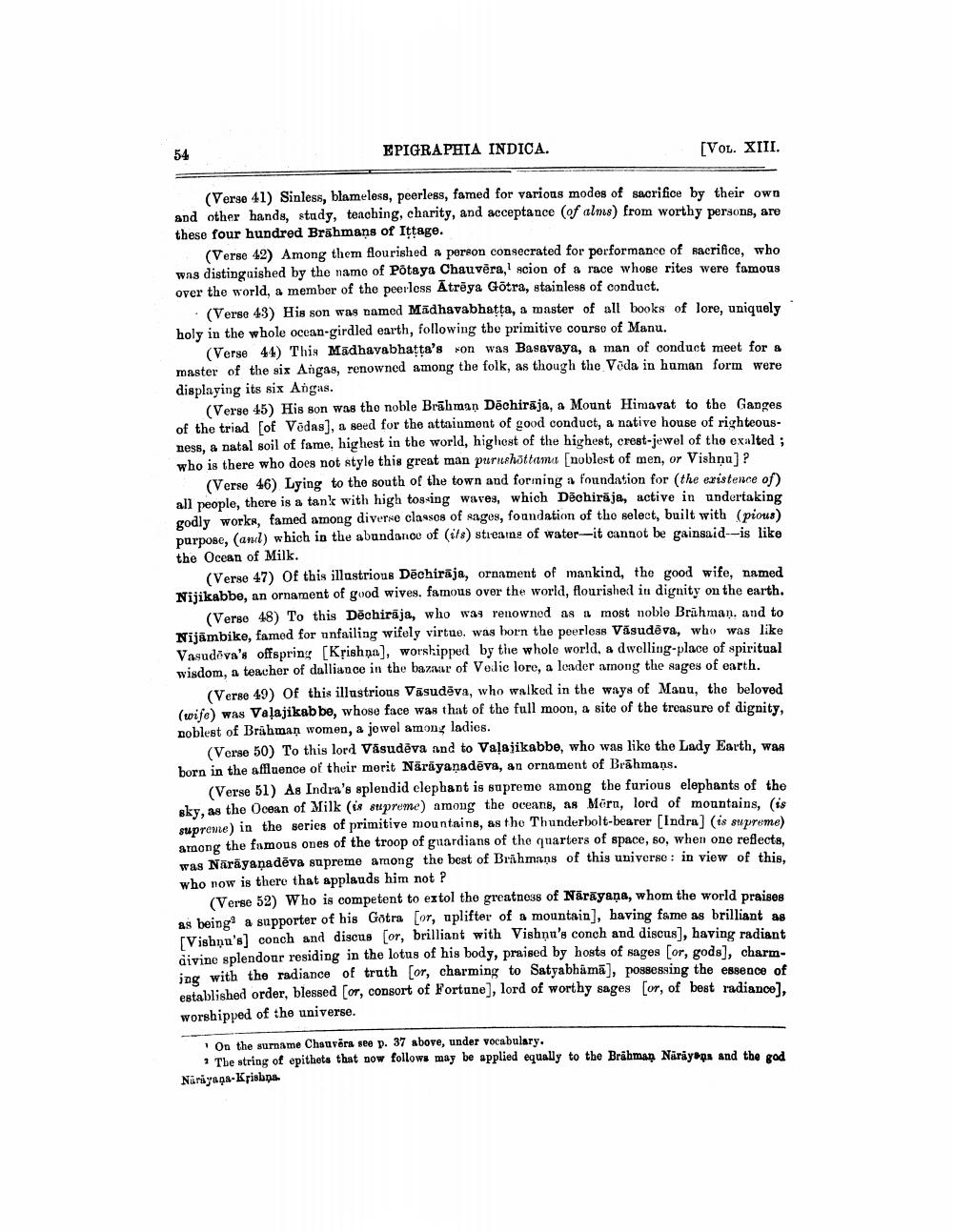________________
54
EPIGRAPHIA INDICA.
[VOL. XIII.
(Verse 41) Sinless, blameless, peerless, famed for various modes of sacrifice by their own and other hands, study, teaching, charity, and acceptance (of alms) from worthy persons, are these four hundred Brahmans of Iṭṭage.
(Verse 42) Among them flourished a person consecrated for performance of sacrifice, who was distinguished by the name of Potaya Chauvēra, scion of a race whose rites were famous over the world, a member of the peerless Atreya Götra, stainless of conduct.
(Verse 43) His son was named Madhavabhaṭṭa, a master of all books of lore, uniquely holy in the whole ocean-girdled earth, following the primitive course of Manu.
(Verse 44) This Madhavabhaṭṭa's son was Basavaya, a man of conduct meet for a master of the six Angas, renowned among the folk, as though the Veda in human form were displaying its six Angas.
(Verse 45) His son was the noble Brahman Dechiraja, a Mount Himavat to the Ganges of the triad [of Vodas], a seed for the attainment of good conduct, a native house of righteousness, a natal soil of fame, highest in the world, highest of the highest, crest-jewel of the exalted; who is there who does not style this great man purushottama [noblest of men, or Vishnu]?
(Verse 46) Lying to the south of the town and forming a foundation for (the existence of) all people, there is a tank with high tossing waves, which Dechiraja, active in undertaking godly works, famed among diverse classes of sages, foundation of the select, built with (pious) purpose, (and) which in the abundance of (its) streame of water-it cannot be gainsaid-is like the Ocean of Milk.
(Verse 47) Of this illustrious Dechiraja, ornament of mankind, the good wife, named Nijikabbe, an ornament of good wives, famous over the world, flourished in dignity on the earth.
(Verse 48) To this Dechiraja, who was renowned as a most noble Brahman, and to Nijambike, famed for unfailing wifely virtue, was born the peerless Väsudēva, who was like Vasudeva's offspring [Krishna], worshipped by the whole world, a dwelling-place of spiritual wisdom, a teacher of dalliance in the bazaar of Vedic lore, a leader among the sages of earth.
(Verse 49) Of this illustrious Vasudeva, who walked in the ways of Manu, the beloved (wife) was Valajikabbe, whose face was that of the full moon, a site of the treasure of dignity, noblest of Brahman women, a jewel among ladies.
(Verse 50) To this lord Vasudeva and to Valajikabbe, who was like the Lady Earth, was born in the affluence of their merit Nārāyaṇadēva, an ornament of Brahmans.
(Verse 51) As Indra's splendid elephant is supreme among the furious elephants of the sky, as the Ocean of Milk (is supreme) among the oceans, as Meru, lord of mountains, (is supreme) in the series of primitive mountains, as the Thunderbolt-bearer [Indra] (is supreme) among the famous ones of the troop of guardians of the quarters of space, so, when one reflects, was Nārāyaṇadeva supreme among the best of Brahmans of this universe: in view of this, who now is there that applauds him not?
(Verse 52) Who is competent to extol the greatness of Narayana, whom the world praises as being a supporter of his Gotra [or, uplifter of a mountain], having fame as brilliant as [Vishnu's] conch and discus [or, brilliant with Vishnu's conch and discus], having radiant divine splendour residing in the lotus of his body, praised by hosts of sages [or, gods], charming with the radiance of truth [or, charming to Satyabhama], possessing the essence of established order, blessed [or, consort of Fortune], lord of worthy sages [or, of best radiance], worshipped of the universe.
On the surname Chauvera see p. 37 above, under vocabulary.
2 The string of epithets that now follows may be applied equally to the Brahman Näräyspa and the god Narayana-Krishna.




